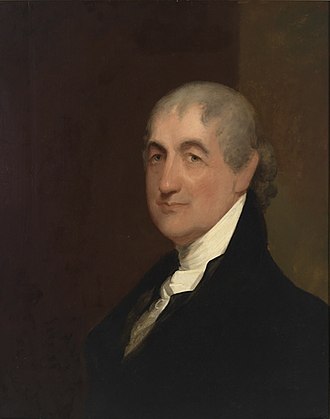Early Life and Career
Caleb Strong was born on January 9, 1745, in Northampton, Massachusetts. He graduated from Harvard College in 1764 and subsequently studied law. Admitted to the bar in 1772, he returned to Northampton, where he established a successful legal practice and became a respected community leader. During the American Revolution, he served as a selectman and as a member of Northampton’s Committee of Safety.
From 1776 to 1780, Strong represented Hampshire County in the Massachusetts General Court. He also served as county attorney during this period. In 1779 and 1780, he was a delegate to the Massachusetts Constitutional Convention, where he played a key role in drafting the state’s constitution—one of the oldest written constitutions still in effect today.
Constitutional Convention
In 1787, at the age of 42, Strong was appointed as a delegate to the Philadelphia Convention. A committed Federalist, he advocated for a strong central government and contributed meaningfully to the debates. He successfully proposed that all revenue bills originate in the House of Representatives and supported the Connecticut Compromise, which helped resolve the dispute between large and small states over legislative representation.
Strong was forced to leave the convention early due to a family illness and, as a result, did not sign the final version of the Constitution. Nonetheless, he remained a staunch supporter of its ratification.
Later Public Service and Legacy
Upon his return to Massachusetts, Strong emerged as a leading Federalist voice in the state’s ratifying convention, helping to secure Massachusetts’ approval of the Constitution in 1788. The state legislature elected him to the United States Senate in 1789, where he served until 1796. During his tenure, he helped draft the Judiciary Act of 1789, which established the federal court system, and supported the Jay Treaty of 1795, which sought to normalize relations with Great Britain.
In 1800, Strong was elected governor of Massachusetts, defeating Elbridge Gerry. He served as governor from 1800 to 1807 and again from 1812 to 1816. During his time in office, he reformed the state militia, opposed the War of 1812, and supported the findings of the Hartford Convention, which criticized the war and called for constitutional amendments to limit federal power.
Strong retired from public life in 1816. He died on November 7, 1819, in Northampton and was buried in Bridge Street Cemetery.
Legacy
Caleb Strong’s career reflected the ideals of prudence, moderation, and constitutional governance. As both a framer and a steward of the American republic, he played a vital role in shaping state and national institutions during the formative years of the United States. His legacy endures in the legal and constitutional foundations he helped build.






